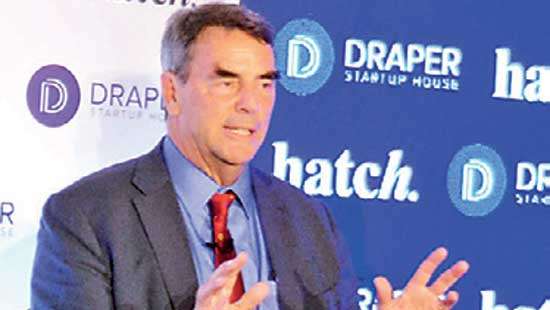Reply To:
Name - Reply Comment

By Nishel Fernando
Billionaire venture capitalist Tim Draper proposes Sri Lanka to adopt bitcoin as its currency while enabling cross industry adoption of artificial intelligence (AI) through 5G to position the country as paradise for global entrepreneurs.
|
Tim Draper |
“My advice to Sri Lanka is, you have been painted into a corner by the press, you have to repaint yourself as a place for entrepreneurs and place for technology. The best suggestions I made to the president was that think of in terms of attracting entrepreneurs to the country. How do you attract entrepreneurs to the country? That’s by encouraging them to come and make their lives really interesting and exciting while they are here. If you had 5G everywhere, if you had bitcoin as the currency, if you had specialisation in AI, the government starts to say we are going to start using AI everywhere we go and we are going to transform our country that’s digitised and by being digitised, it’s honest.
Amazing things could happen,” he said. He made these remarks joining a panel discussion titled ‘From Troubled Nation to Startup Nation’, organised by the award-winning Sri Lankan co-working space, start-up incubator and accelerator Hatch, in Colombo, on Tuesday evening. Hatch has entered into a strategic partnership with Draper Startup House, a global network of spaces connected to resources for entrepreneurs.
As part of the partnership, Draper arrived in Sri Lanka to engage with the key stakeholders in the government, including President Ranil Wickremesinghe and the local start-up ecosystem. Draper insisted that Sri Lanka could replicate the success of El Salvador and Estonia that adopted the latest technologies to transform their nations.
“It’s going to change every industry in the world. Why don’t you jump ahead and say that we are the country for AI; we are the country that’s going to make it easy for everyone.
Then, you are going to attract everybody. El Salvador wasn’t particularly interesting country for anybody. Then they adopted bitcoin as their national currency. Then, people started flooding there. Estonia wasn’t very particularly interesting either. Then they created the virtual residency programme, digitised identity, digital voting, digital parking, etc. If you get known for something around the world and you put up that banner, everybody is going to come to your country,” he elaborated. In particular, he stressed that for a country such as Sri Lanka, which had seen its fiat currency depreciating by 80 percent in six months, makes sense to adopt decentralised bitcoin as the official currency.
“Pretty soon, you are going to say why do I even work in my government fiat currency? Why would I want a rupee here? It dropped 80 percent in six months. Why do I want that. Sure, bitcoin has taken a huge hit but it is still not bad as that. They are going to say I’d rather have a currency that’s going to increase in value overtime than the one almost guarantees that you are going to lose value next year,” he added. He opined that the decentralised virtual currencies such as bitcoin has the potential to avert a future economic crisis driven by excess money printing and reckless fiscal spending. “In most countries, it’s usually one person who prints too much money, doesn’t manage the economy well, spends money recklessly or creates horrible inflation. You don’t get that if you have a decentralised currency because if it gets pushed down at one place, it pops up at another. It’s global, transparent, keeps perfect records, faster way to send money and everything is better. I believe next revolution, bitcoin and then AI, have the potential to even bigger than what internet was,” he said. In addition, he noted that by replacing fiat currency with bitcoin, the government could increase its tax collections while reducing corruption and unnecessary expenditure.
“Bitcoin has opened up a number of interesting markets. Blockchain keeps perfect records. Only few governments recognised this but as soon as the government recognised this, they will get their taxes without having to have an auditor, accountant, bookkeeper, transfer agent or whatever. It keeps perfect records, so it gets rid of corruption. That’s just the blockchain. Then there’s smart contracts. If you do a legal deal with a smart contract, then you don’t need a lawyer. We do a deal and that’s in software, that’s the deal,” he added.